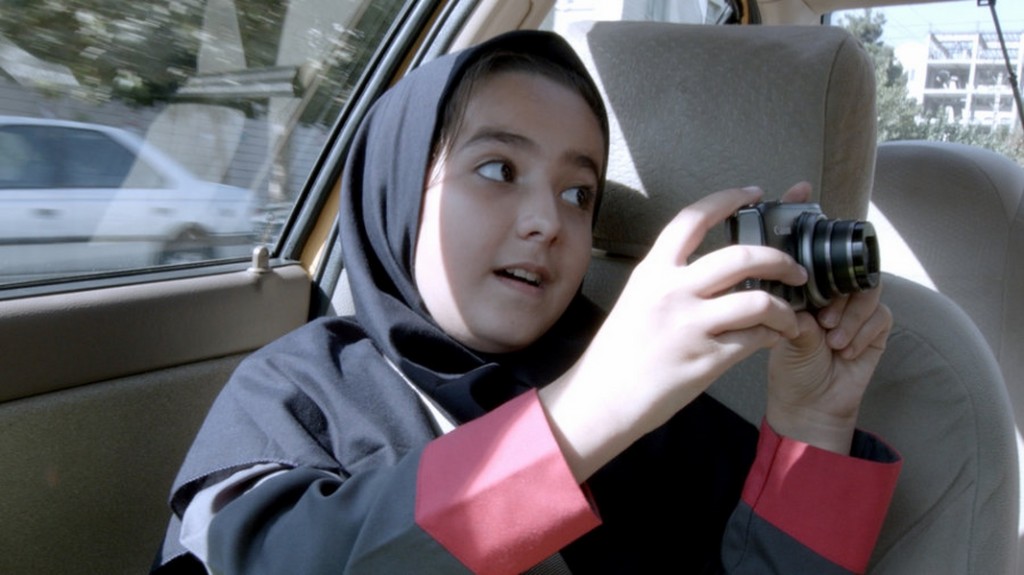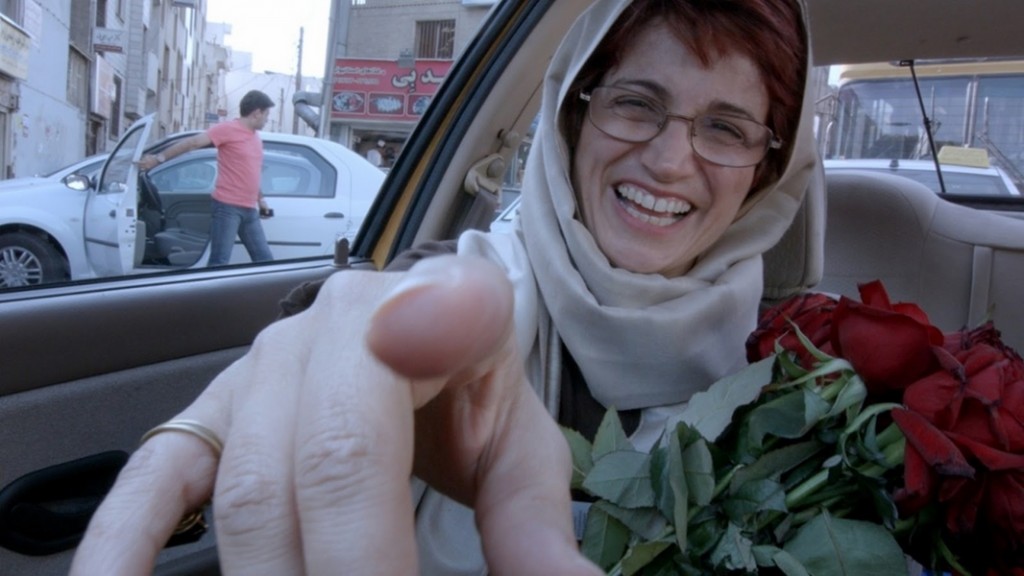The banned Iranian filmmaker’s latest technical and artistic triumph screens at 5:00p on Fri as part of the Marquee Film Festival
Taxi Tehran [تاکسی] represents yet another victory lap for banned Iranian director Jafar Panahi, who continues to seek glorious innovation after the government instituted a 20-year embargo against his brand of “propaganda” in 2010. Undeterred, Panahi and an anonymous crew’s resultant films, This is Not a Film (2011) and Closed Curtain (2013), have been clandestinely shot, illegally smuggled out of the censorship-happy country, and internationally celebrated for their addressing of contemporary politics and personal isolation. Taxi Tehran is undoubtedly the most liberated and spirited yet, immediately registering as a series of fourth-wall-breaking sketches of Panahi playing the part of an Uber driver. As the colorful cast of denizens continue dropping in, it slowly comes to resemble Holy Motors (2012) as directed by fellow art house auteur, Abbas Kiarostami.
Passing a bustling metropolitan intersection, friendly neighborhood driver Panahi spins a mounted dashboard/rear-view mirror camera 180 degrees as a hot-headed front seat passenger mistakes it for an anti-theft device. The subject launches the man into a bizarre diatribe about how all four tires were stolen off his vehicle and replaced with bricks, and he sticks to his belief in harsh retaliation until a rational female teacher in the backseat speaks up to challenge his “skewed” views. Less than 10 minutes in, the subject of “reality” is challenged by the legitimate political concerns of the conversation and the candid nature in which they are expressed. In actuality, much of this quasi-documentary has been ingeniously (and sometimes clumsily) staged, from sequences of pedestrians and passersby rattling the taxi windows, to a hysterical wife cradling her dying husband as he dictates his will, to more frequent conversations that meditate on the current state of Iranian censorship, personal reminiscence, and filmmaking itself (also explored directly in This is Not a Film, the more rigid companion piece).
The Tehranian tour truly mines the meta with the presence of the perspiring Omid, supposedly Panahi’s old friend who used to work at a local video store. The gleeful cinephile is now hocking bootleg copies of everything from B-movies to Hollywood staples and art house classics, and he proceeds to orchestrate a meeting with a student client out of Panahi’s taxi (that begins with a shot at a white gate that seems to imitate an early one in Kiarostami’s 1990 film, Close-Up). The whole scene is as humorous as it is conceptually and morally engaging, with Omid making his case for distributing the discs, as this is the only way for Iranians to currently catch a glimpse into the entertainment world outside their country.
Obviously reflective of Panahi’s marginalization, Taxi Tehran resolutely demonstrates Panahi’s limited means to make a feature, which has the feel of a bootleg in many ways, particularly in the increasingly open guerrilla filming. With the introduction of the director’s haughty, precocious young niece, Hana, it delves deeply into political and autobiographical territory concerning the act of filmmaking, as the camera oscillates between their points of view, randomly targeting subjects inside and outside the vehicle.
One of the most singular frames in Taxi Tehran superimposes perspectives/realities where a professional photographer shoots a bride and groom on the street approaching a car; Hana then films a young thief slinking towards the married couple, and Panahi’s dashboard camera over her shoulder captures the entire depth of field on a diagonal, so it appears as if this is part of a strange camera obscura. This scene, as with many others involving Hana, particularly those of her reading class notes on ‘Rules of Islamic Filmmaking,’ are not only astutely playful observations on the cinema climate in the country. They are didactic in their instruction to aspiring filmmakers facing censorship and how to persevere in the face of “sordid realism” labels (basically, documenting anything that may harm the image of the regime).
While the filming is confined to the car, Panahi’s persuasive enthusiasm permeates every encounter. Even if the execution isn’t perfect, gander no further than the myriad of callbacks to his earlier career, which are handled with witty intention. They greatly informed the sentimentality of This is Not a Film, but they are more like trivia here. The first is pitched by Omid, in relation to the staging of the first scene with the hot-head and the teacher, as it reminds him of one of the last lines in Crimson Gold (2003). In the absence of traditional distribution and rights to make his art under state sponsorship, Taxi Tehran is a kind of daring cinematic magic trick. One can only imagine what else Panahi has up his sleeve.
- Taxi Tehran screens Nov 13 at 5:00p as part of WUD Film’s Marquee Film Festival, which we’re covering with Madison Film Forum all week. Admission is FREE.


